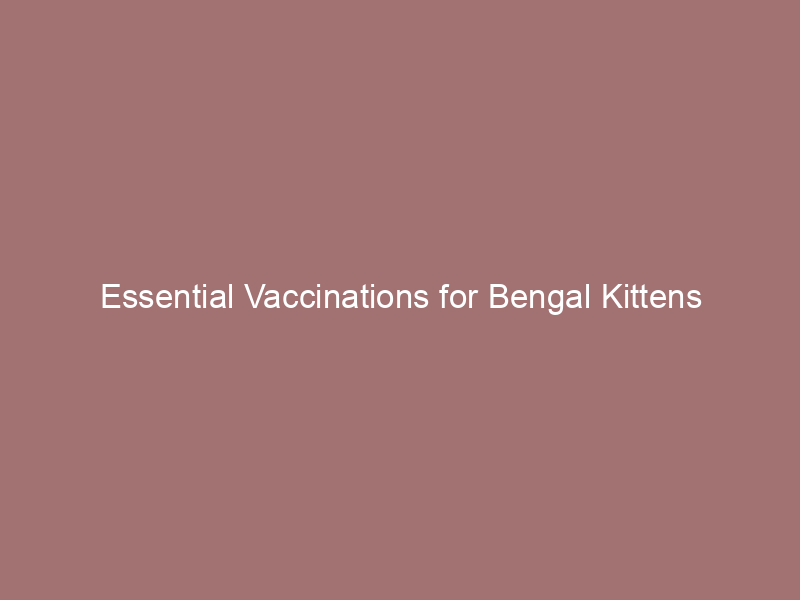
Introduction: Essential Vaccinations for Bengal Kittens
They help protect your pet from various diseases. In this section, we will discuss why vaccinations are important and explain the vaccination schedule for Bengal kittens.
- Importance of Vaccinations for Bengal Kittens: Vaccinations help your Bengal kitten build immunity against harmful diseases. Without them, your kitten is at risk of getting sick from viruses and bacteria. Vaccines protect against illnesses like feline distemper, feline herpesvirus, and rabies. These diseases can be serious and sometimes even fatal. By vaccinating your kitten, you are ensuring they have a better chance at a healthy life.
- Understanding the Bengal Kitten Vaccination Schedule: Kittens usually start their vaccinations at around 6-8 weeks old. They will need several shots over the next few months. Here is a simple schedule to follow:
Age Vaccine 6-8 weeks FVRCP (Feline Viral Rhinotracheitis, Calicivirus, Panleukopenia) 10-12 weeks Booster for FVRCP 14-16 weeks Final booster for FVRCP and Rabies 1 year Annual boosters for FVRCP and Rabies Following this schedule will help ensure your Bengal kitten stays protected as they grow.
Bengal Kitten Immunization Guide
Must-Have Vaccines for Bengal Kittens
-
Core Vaccines for Bengal Kittens
- Feline Panleukopenia (FPV): This vaccine protects against a deadly virus that causes severe vomiting and diarrhea.
- Feline Herpesvirus (FHV-1): This vaccine helps prevent respiratory infections.
- Feline Calicivirus (FCV): This vaccine also protects against respiratory infections.
- Rabies: This vaccine is crucial as rabies is a fatal disease that can spread to humans.
-
Non-Core Vaccines for Bengal Kittens
- Feline Leukemia Virus (FeLV): This vaccine is recommended if your Bengal kitten goes outside or comes into contact with other cats.
- Bordetella: This vaccine can help prevent respiratory infections, especially if your kitten is exposed to other cats often.
- Chlamydia: This vaccine protects against another type of respiratory infection.
Bengal Kitten Health and Vaccinations
Kitten Vaccination Timeline for Bengals
- First Month Vaccinations: In the first month, Bengal kittens need their initial vaccinations. These include shots for feline distemper, also known as panleukopenia, and respiratory infections like calicivirus and rhinotracheitis.
- Subsequent Monthly Vaccinations: After the first month, Bengal kittens should receive booster shots every month until they are about 16 weeks old. These boosters help strengthen their immune system. They may also get vaccinated for feline leukemia virus (FeLV) if they are at risk.
- Annual Vaccinations: Once your Bengal kitten reaches one year, they will need annual vaccinations to keep their immunity strong. These yearly shots usually include boosters for the core vaccines and any other vaccines recommended by your vet.
| Age | Vaccinations |
|---|---|
| 1 Month | Feline Distemper, Calicivirus, Rhinotracheitis |
| 2-4 Months | Booster shots, Feline Leukemia Virus (if needed) |
| 1 Year | Annual boosters |
Bengal Kitten Disease Prevention
Recommended Vaccines for Bengal Kittens
- Rabies Vaccine: Rabies is a deadly virus that can affect both animals and humans. Vaccinating your kitten helps protect them and prevents the spread of this serious disease.
- Feline Leukemia Virus (FeLV) Vaccine: FeLV is a virus that weakens a cat’s immune system, making them more susceptible to other infections. The FeLV vaccine helps protect your Bengal kitten from this virus, ensuring they stay healthy and strong.
- Feline Immunodeficiency Virus (FIV) Vaccine: FIV is similar to HIV in humans and can lead to a weakened immune system in cats. The FIV vaccine helps safeguard your Bengal kitten from this virus, promoting a longer and healthier life.
Bengal Kitten Wellness and Vaccines
Protecting Bengal Kittens with Vaccines
-
- Importance of Regular Vet Check-ups
These visits help ensure your kitten is growing well and staying healthy. Vets can catch early signs of illness and provide necessary treatments.
-
- Monitoring Bengal Kitten’s Health Post-Vaccination
Watch for any unusual signs like lethargy, loss of appetite, or swelling at the injection site. If you notice anything concerning, contact your vet immediately. Keeping a close eye on your kitten helps ensure they stay healthy and happy.
Ensuring the Health of Your Bengal Kitten
- Recap of Vaccinations: Bengal kittens need several key vaccinations to stay healthy. These include vaccines for Feline Panleukopenia, Feline Calicivirus, and Feline Herpesvirus. These vaccines protect against serious diseases that can be life-threatening.
- Importance of Adhering to the Vaccination Schedule: Sticking to the vaccination schedule is vital. It ensures your kitten gets the right protection at the right time. Missing or delaying shots can leave your kitten vulnerable to diseases. Always follow your vet’s advice and keep track of vaccination dates.






